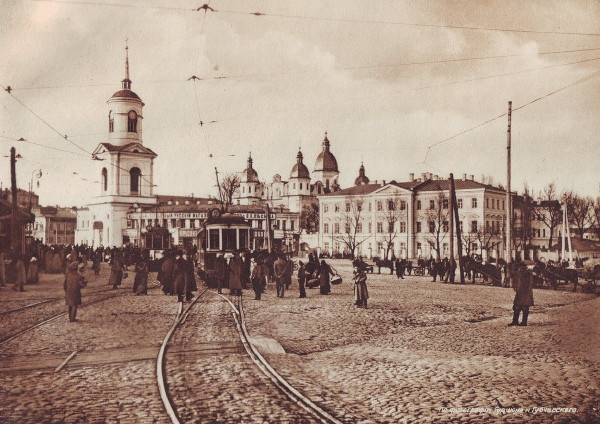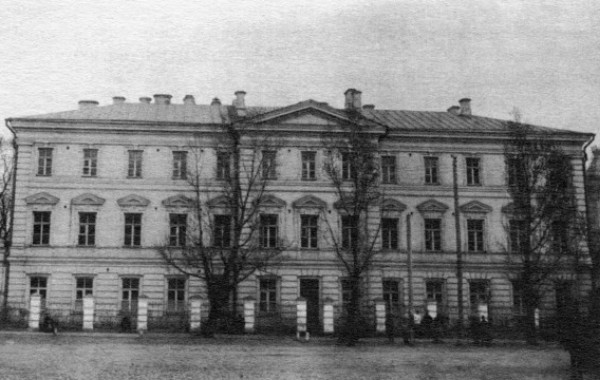Kyiv Theological Academy
Kyiv Theological Academy [Київська духовна академія; Kyivska dukhovna akademiia]. A higher theological school founded in 1819 at the Kyiv Epiphany Brotherhood Monastery as the successor to the Kyivan Mohyla Academy. The academy developed religious scholarship, trained teachers for theological seminaries, and supervised eight seminaries. It was an important instrument in the Russification of the Orthodox church and rite in Ukraine. At first, it was organized according to the theological education statutes of 1808. It was headed by a rector (from 1874 the rectors were granted the title of bishop and made vicars of Kyiv eparchy) and professors’ council, and was supervised by the Commission of Theological Schools (to 1839) and then by the Holy Synod. In 1869 the rights of the professors’ council were broadened and the qualifications for professors were raised. The new educational statutes of 1884 abolished secret elections to the professors’ council and transferred supervision over the academy to the Kyivan metropolitan (see Kyiv metropoly). The provisional regulations of 1906 withdrew this supervision and returned the power to grant academic degrees to the professors’ council (for some time this had been the prerogative of the Holy Synod).
The course of study lasted four years. From 1869 it covered three fields: theology, church history, and church rite. The students were graduates of theological seminaries, most of them sons of priests. Their number averaged approximately 200 (in 1897 there were 175, and in 1913,199). Students lived in a student residence attached to the academy. Upon graduation many went on to work in the bureaucracy or in private careers. In 1913 there were 39 professors at the academy. Among the more distinguished faculty members were Innokentii Borisov (rector 1830–6), Makarii Bulgakov, Ivan Malyshevsky, Pylyp Ternovsky, Volodymyr Zavitnevych, Mykola I. Petrov, Stepan Golubev, Teodor Titov, Orest Novytsky, Pamfil Yurkevych, and Petro Linytsky. Many important Ukrainian scholars and church and civic leaders graduated from the academy; eg, Ivan Nechui-Levytsky, Pylyp Kozytsky, Oleksander Koshyts, Kostiantyn Vobly, and Polikarp Sikorsky. As a student there in the 1890s Oleksander Lototsky organized an underground Ukrainian group that fostered the development of Ukrainian national consciousness among the students.
From 1837 the academy published the popular weekly journal Voskresnoe Chtenie and from 1860 the scholarly monthly Trudy Kievskoi dukhovnoi akademii. The academy’s invaluable library, begun by Petro Mohyla, had large collections of manuscripts, old documents, and early printed books; it is now part of the National Library of Ukraine. In 1872 the Church-Archeological Society and an associated museum were established at the academy. The museum’s long-time director was Mykola I. Petrov. Documents from the history of the academy were published in 10 volumes by Petrov (1904–8) and Teodor Titov (1910–15). Throughout its existence the Kyiv Theological Academy was the only Orthodox higher school of theology in Ukraine. It was abolished by the Soviet authorities in 1920.
The Kyiv Theological Academy and Seminary was revived in 1993 under the Ukrainian Orthodox Church-Kyiv Patriarchate. The course of study for the seminary is four years, with the academy providing an additional four years for those wishing to pursue advanced religious studies. The Ukrainian Orthodox Church-Moscow Patriarchate also sponsors its own Kyiv Theological Academy and Seminary.
BIBLIOGRAPHY
Malyshevskii, I. Istoricheskaia zapiska o sostoianii Akademii v minuvshee piatidesiatiletie (Kyiv 1869)
Piatidesiatiletnyi Iubilei Kievskoi Dukhovnoi Akademii (Kyiv 1869)
Titov, Kh. Stara vyshcha osvita v Kyïvs'kii Ukraïni kintsia XVI–pochatku XIX st. (Kyiv 1924)
Ivan Korovytsky, Arkadii Zhukovsky
[This article was updated in 2005.]


